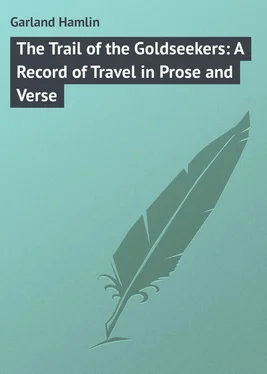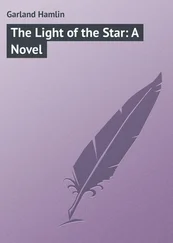Hamlin Garland - The Trail of the Goldseekers - A Record of Travel in Prose and Verse
Здесь есть возможность читать онлайн «Hamlin Garland - The Trail of the Goldseekers - A Record of Travel in Prose and Verse» — ознакомительный отрывок электронной книги совершенно бесплатно, а после прочтения отрывка купить полную версию. В некоторых случаях можно слушать аудио, скачать через торрент в формате fb2 и присутствует краткое содержание. Жанр: foreign_prose, foreign_adventure, на английском языке. Описание произведения, (предисловие) а так же отзывы посетителей доступны на портале библиотеки ЛибКат.
- Название:The Trail of the Goldseekers: A Record of Travel in Prose and Verse
- Автор:
- Жанр:
- Год:неизвестен
- ISBN:нет данных
- Рейтинг книги:3 / 5. Голосов: 1
-
Избранное:Добавить в избранное
- Отзывы:
-
Ваша оценка:
- 60
- 1
- 2
- 3
- 4
- 5
The Trail of the Goldseekers: A Record of Travel in Prose and Verse: краткое содержание, описание и аннотация
Предлагаем к чтению аннотацию, описание, краткое содержание или предисловие (зависит от того, что написал сам автор книги «The Trail of the Goldseekers: A Record of Travel in Prose and Verse»). Если вы не нашли необходимую информацию о книге — напишите в комментариях, мы постараемся отыскать её.
The Trail of the Goldseekers: A Record of Travel in Prose and Verse — читать онлайн ознакомительный отрывок
Ниже представлен текст книги, разбитый по страницам. Система сохранения места последней прочитанной страницы, позволяет с удобством читать онлайн бесплатно книгу «The Trail of the Goldseekers: A Record of Travel in Prose and Verse», без необходимости каждый раз заново искать на чём Вы остановились. Поставьте закладку, и сможете в любой момент перейти на страницу, на которой закончили чтение.
Интервал:
Закладка:
We had been on the road from Quesnelle a week, and had made nearly one hundred miles, jogging along some fifteen miles each day, camping, eating, sleeping, with nothing to excite us – indeed, the trail was quiet as a country lane. A dead horse here and there warned us to be careful how we pushed our own burden-bearers. We were deep in the forest, with the pale blue sky filled with clouds showing only in patches overhead. We passed successively from one swamp of black pine to another, over ridges covered with white pine, all precisely alike. As soon as our camp was set and fires lighted, we lost all sense of having travelled, so similar were the surroundings of each camp.
Partridges could be heard drumming in the lowlands. Mosquitoes were developing by the millions, and cooking had become almost impossible without protection. The "varments" came in relays. A small gray variety took hold of us while it was warm, and when it became too cold for them, the big, black, "sticky" fellows appeared mysteriously, and hung around in the air uttering deep, bass notes like lazy flies. The little gray fellows were singularly ferocious and insistent in their attentions.
At last, as we were winding down the trail beneath the pines, we came suddenly upon an Indian with a gun in the hollow of his arm. So still, so shadowy, so neutral in color was he, that at first sight he seemed a part of the forest, like the shaded hole of a tree. He turned out to be a "runner," so to speak, for the ferrymen at Tchincut Crossing, and led us down to the outlet of the lake where a group of natives with their slim canoes sat waiting to set us over. An hour's brisk work and we rose to the fine grassy eastern slope overlooking the lake.
We rose on our stirrups with shouts of joy. We had reached the land of our dreams! Here was the trailers' heaven! Wooded promontories, around which the wavelets sparkled, pushed out into the deep, clear flood. Great mountains rose in the background, lonely, untouched by man's all-desolating hand, while all about us lay suave slopes clothed with most beautiful pea-vine, just beginning to ripple in the wind, and beyond lay level meadows lit by little ponds filled with wildfowl. There was just forest enough to lend mystery to these meadows, and to shut from our eager gaze the beauties of other and still more entrancing glades. The most exacting hunter or trailer could not desire more perfect conditions for camping. It was God's own country after the gloomy monotony of the barren pine forest, and needed only a passing deer or a band of elk to be a poem as well as a picture.
All day we skirted this glorious lake, and at night we camped on its shores. The horses were as happy as their masters, feeding in plenty on sweet herbage for the first time in long days.
Late in the day we passed the largest Indian village we had yet seen. It was situated on Stony Creek, which came from Tatchick Lake and emptied into Tchincut Lake. The shallows flickered with the passing of trout, and the natives were busy catching and drying them. As we rode amid the curing sheds, the children raised a loud clamor, and the women laughed and called from house to house, "Oh, see the white men!" We were a circus parade to them.
Their opportunities for earning money are scant, and they live upon a very monotonous diet of fish and possibly dried venison and berries. Except at favorable points like Stony Creek, where a small stream leads from one lake to another, there are no villages because there are no fish.
I shall not soon forget the shining vistas through which we rode that day, nor the meadows which possessed all the allurement and mystery which the word "savanna" has always had with me. It was like going back to the prairies of Indiana, Illinois, and Iowa, as they were sixty years ago, except in this case the elk and the deer were absent.
YET STILL WE RODE
We wallowed deep in mud and sand;
We swam swift streams that roared in wrath;
They stood at guard in that lone land,
Like dragons in the slender path.
Yet still we rode right on and on,
And shook our clenched hands at the sky.
We dared the frost at early dawn,
And the dread tempest sweeping by.
It was not all so dark. Now and again
The robin, singing loud and long,
Made wildness tame, and lit the rain
With sudden sunshine with his song.
Wild roses filled the air with grace,
The shooting-star swung like a bell
From bended stem, and all the place
Was like to heaven after hell.
CHAPTER VIII
WE SWIM THE NECHACO
Here was perfection of camping, but no allurement could turn the goldseekers aside. Some of them remained for a day, a few for two days, but not one forgot for a moment that he was on his way to the Klondike River sixteen hundred miles away. In my enthusiasm I proposed to camp for a week, but my partner, who was "out for gold instid o' daisies, 'guessed' we'd better be moving." He could not bear to see any one pass us, and that was the feeling of every man on the trail. Each seemed to fear that the gold might all be claimed before he arrived. With a sigh I turned my back on this glorious region and took up the forward march.
All the next day we skirted the shores of Tatchick Lake, coming late in the afternoon to the Nechaco River, a deep, rapid stream which rose far to our left in the snowy peaks of the coast range. All day the sky to the east had a brazen glow, as if a great fire were raging there, but toward night the wind changed and swept it away. The trail was dusty for the first time, and the flies venomous. Late in the afternoon we pitched camp, setting our tent securely, expecting rain. Before we went to sleep the drops began to drum on the tent roof, a pleasant sound after the burning dust of the trail. The two trampers kept abreast of us nearly all day, but they began to show fatigue and hunger, and a look of almost sullen desperation had settled on their faces.
As we came down next day to where the swift Nechaco met the Endako rushing out of Fraser Lake, we found the most dangerous flood we had yet crossed. A couple of white men were calking a large ferry-boat, but as it was not yet seaworthy and as they had no cable, the horses must swim. I dreaded to see them enter this chill, gray stream, for not only was it wide and swift, but the two currents coming together made the landing confusing to the horses as well as to ourselves. Rain was at hand and we had no time to waste.
The horses knew that some hard swimming was expected of them and would gladly have turned back if they could. We surrounded them with furious outcry and at last Ladrone sprang in and struck for the nearest point opposite, with that intelligence which marks the bronco horse. The others followed readily. Two of the poorer ones labored heavily, but all touched shore in good order.
The rain began to fall sharply and we were forced to camp on the opposite bank as swiftly as possible, in order to get out of the storm. We worked hard and long to put everything under cover and were muddy and tired at the end of it. At last the tent was up, the outfit covered with waterproof canvas, the fire blazing and our bread baking. In pitching our camp we had plenty of assistance at the hands of several Indian boys from a near-by village, who hung about, eager to lend a hand, in the hope of getting a cup of coffee and a piece of bread in payment. The streaming rain seemed to have no more effect upon them than on a loon. The conditions were all strangely similar to those at the Muddy River.
Night closed in swiftly. Through the dark we could hear the low swish of the rising river, and Burton, with a sly twinkle in his eye, remarked, "For a semi-arid country, this is a pretty wet rain."
Читать дальшеИнтервал:
Закладка:
Похожие книги на «The Trail of the Goldseekers: A Record of Travel in Prose and Verse»
Представляем Вашему вниманию похожие книги на «The Trail of the Goldseekers: A Record of Travel in Prose and Verse» списком для выбора. Мы отобрали схожую по названию и смыслу литературу в надежде предоставить читателям больше вариантов отыскать новые, интересные, ещё непрочитанные произведения.
Обсуждение, отзывы о книге «The Trail of the Goldseekers: A Record of Travel in Prose and Verse» и просто собственные мнения читателей. Оставьте ваши комментарии, напишите, что Вы думаете о произведении, его смысле или главных героях. Укажите что конкретно понравилось, а что нет, и почему Вы так считаете.











